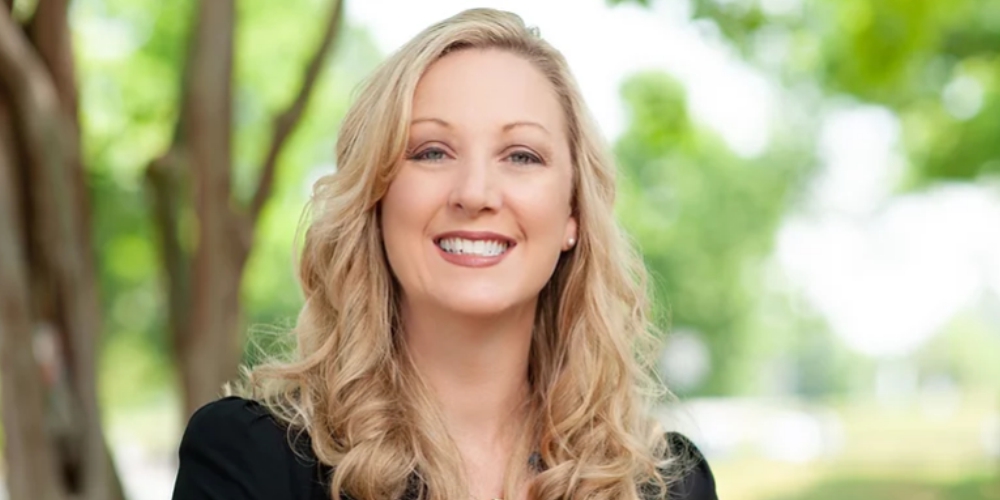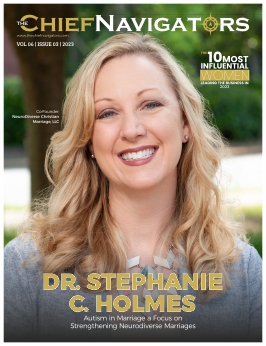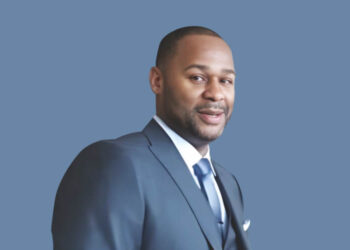STEPHANIE C. HOLMES: Autism in Marriage a Focus on Strengthening Neurodiverse Marriages
The 10 Most Influential Women leading the business in 2023

Marriage is a journey filled with love, companionship, and challenges. When one or both partners are neurodivergent, such as being on the autism spectrum, it brings a unique set of dynamics to the relationship. In a neurodiverse marriage, addressing specific aspects becomes crucial to fostering understanding, acceptance, and a thriving partnership. By focusing on key areas such as understanding, communication, emotional support, sensory considerations, shared interests, and seeking resources, couples can build a strong and supportive foundation for their marriage.
In the bustling world of counseling/coaching, Dr. Stephanie C. Holmes stands out as a beacon of hope and understanding for neurodiverse marriages or families where one or more members are on the autism spectrum. With her empathetic approach and firsthand experience as a parent and spouse, Dr. Stephanie has emerged as a trusted advocate and ally in the autism community.
Her path towards becoming a Licensed Professional Counselor (LPC) in North Carolina began in 2000, when she embarked on her Master’s in Counseling. Little did she know that her own family would soon face a life-altering challenge that would shape her career trajectory. It all started when her eldest daughter began encountering difficulties at school. The educational system labeled her struggles as “Behavioral Challenges,” but Dr. Stephanie sensed that there was something deeper at play. This hunch led her on a quest for answers, eventually leading to a diagnosis of Asperger’s Syndrome, which has since been reclassified as Autism Level 1.
Over the course of two years, Dr. Stephanie went through a complex diagnosis process, searching for providers and support for her daughter and family. This experience led her to transition her focus towards advocating and supporting other families and individuals on the autism spectrum. In 2009, after relocating to Georgia, she shifted her professional focus to coaching, counseling, and consulting services for individuals, marriages, and families affected by autism.
Supporting Neurodiverse Couples
Dr. Stephanie initially started her work by assessing autism and providing support to children, teenagers, and young adults on the autism spectrum, helping them acquire skills and navigate transitions. Recognizing that parents of children with autism often face marital challenges within the neurodiverse family system, she began working with them to strengthen their relationships. Dr. Stephanie also recognized the need for support among siblings who may feel neglected or require a space to discuss their unique challenges. As she worked closely with families, she observed a pattern where if a child was identified as being on the spectrum, there was a possibility that one of the parents also had autism, leading to specific nuances and challenges within their marriage—a situation she refers to as being a neurodiverse couple.
In 2019, Dr. Stephanie’s husband received an autism diagnosis, prompting her to shift her focus towards supporting neurodiverse marriages. While there are many capable counselors and coaches working with individuals and families, there is a lack of expertise in the area of neurodiverse couples. As a result, the majority of her time, energy, and efforts are now devoted to assisting these couples.
Identifying Neurodivergence and Addressing Challenges
Neurodiverse couples face several unique challenges in their relationships, as observed by Dr. Stephanie. The first challenge lies in the assessment or diagnosis process. Many clinicians are ill-equipped to identify autism in adults, making it difficult for couples to even realize they are neurodiverse. The lack of awareness about their neurodivergent status can hinder progress in their relationship.
The second issue arises when one or both partners do not accept their neurodivergence. Without proper education on neurodiversity and autism in the context of marriage, effective therapy cannot commence. Traditional therapy approaches assume that both partners have the same neurotype and possess similar skills, which can be an obstacle in addressing the unique communication challenges that arise in neurodiverse couples. Factors such as theory of mind and differing perceptions of intention versus impact can significantly impede progress in couples’ therapy.
Three Phases Approach
Dr. Stephanie approaches her work in three distinct phases, which can be found in detail at www.christianneurodiversemarriage.com. Her services include educating, equipping, and providing effective strategies. It’s possible that in the initial stages, she may not work with both partners together, as each individual may be on a different journey. One partner may be exploring their identity while the other may be experiencing grief, acceptance, or changing expectations.
The first phase, education, varies for each couple, taking into account their background, family of origin, and sometimes their faith tradition. Once both partners are committed to being a neurodiverse couple, Dr. Stephanie assesses their skills and weaknesses and focuses on leveraging their strengths to address any areas of weakness, fostering teamwork. This process can be quite challenging, and not all couples reach this stage successfully. Couples who follow a faith tradition may face additional challenges, particularly if traditional roles or beliefs about gender in marriage are involved.
Embracing Neurodiversity in Relationships
Dr. Stephanie emphasizes that Autism Spectrum Resources aims to avoid conforming the ND into the neurodiverse (ND) partner conform to neurotypical norms, and likewise, the neurotypical (NT) partner will not be forced into the world of autism/ND. The approach is centered around understanding each partner’s desires, willingness to contribute, and identifying necessary adjustments based on their individual strengths and weaknesses. Strategies are tailored to the specific needs of each couple, taking into account their unique challenges, goals, and potential outcomes, including situations where they may have a child on the spectrum. Depending on their age and circumstances, couples may choose to live as companions or friends, sometimes occupying separate spaces. Creative thinking is employed to find the arrangement that works best for their situation.
Building Bridges of Communication
Dr. Stephanie places great importance on communication within neurodiverse relationships and recognizes that it is a fundamental aspect of daily interactions. She assists couples in enhancing their communication skills, as effective communication is essential for resolving conflicts and fostering emotional connection (intimacy). Given that partners may have different communication styles, with one being more focused on exchanging information and the other seeking emotional connection through conversations, Dr. Stephanie helps couples develop communication strategies that address these differences. Learning how to engage in meaningful conversations and problem-solving is considered a crucial prerequisite for progressing to subsequent stages of their work together.
Cultivating Calmness
Dr. Stephanie acknowledges that managing anxiety and stress in neurodiverse relationships can be a complex endeavor. Each partner may experience anxiety for different reasons, such as sensory issues, trauma, lack of self-regulation, or co-occurring anxiety disorders. Addressing these varied sources of anxiety requires a thorough understanding of each person’s individual experiences. Strategies for managing anxiety can then be tailored based on the specific origins and reasons behind the anxiety. However, some general components may include learning how to decompress, establishing a balanced sensory diet, practicing self-care, and achieving a healthy work-life balance. It’s important to note that this topic is multifaceted and cannot be fully explored in a brief explanation.
Empowering Self-Care and Boundaries
Dr. Stephanie emphasizes the significance of self-care and establishing boundaries in the lives of individuals with special needs. In neurotypical (NT) or non-autistic partnerships, the NT partner may tend to over function or become codependent by taking on more responsibilities than necessary. It is important for the NT partner to set boundaries and determine their own limitations in terms of what they can handle. Developing self-care habits is also crucial for their well-being.
Additionally, Dr. Stephanie suggests that having activities or interests outside of the home, such as hobbies or volunteering, can provide a source of fulfillment unrelated to autism-related responsibilities. Taking breaks and accessing respite services are essential for maintaining balance and preventing burnout in the caregiving role.
Transformation and Mentorship
Dr. Stephanie shares a success story from her practice involving a couple named Mark and Kenda. Their transformative journey can be found at the following link: https://www.focusonthefamily.com/marriage/autism-and-marriage-3-signs-your-spouse-may-be-on-the-autism-spectrum/. After completing the program, Mark and Kenda have not only experienced significant positive changes in their own relationship but have also become mentors for other couples. They now serve as co-leaders in the groups organized by Dr. Stephanie.
Recognizing the scarcity of providers trained to work with neurodiverse couples of faith, Dr. Stephanie and her team established the International Association of ND Christian Marriage. Dr. Stephanie and her family are working on a book about their families journey on the autism spectrum finding hope, discovering joy on their journey as well as a book she and her husband are writing based on academic research for NeuroDiverse Couples.
Dr. Stephanie and her spouse are influencers in this field sharing their lived and professional experience on NeuroDiverse Christian Couples their podcast available at: https://www.mentalhealthnewsradionetwork.com/our-shows/neurodiverse-christian-couples/



